When helping turns deadly…
Signs And Symptoms Of Enabling Behaviors.
Addiction is an insidious illness that compromises every aspect of life. It also negatively impacts the lives of family members. Addiction changes the way people think, feel and behave. These changes can most often be seen through unhealthy behavior patterns such as isolating, disconnecting from family, poor hygiene, sleep changes, financial difficulties, and depressive and/or aggressive mood swings.
When you love someone struggling with addiction, it’s important to understand the difference between helping them and enabling their illness. It’s easy to become overwhelmed by their problems and get caught up in their chaos. You’ve witnessed their decline. You’ve tried helping them. You’ve tried pleading with them. You’ve tried threatening them. You’ve coddled them. You’ve cried with them. You’ve yelled until you’re blue in the face. But nothing you do works.
Please note, your addicted loved one hears you. They don’t feel right about what’s happening, either. Addiction affects the area of the brain responsible for impulse control and reasoning. Simply put, addicts can’t stop and each time they pick up the consequences get worse.
You may have a love/hate relationship with the addicted person. They’re happiest with you when you’re helping them. But when you say no, it’s a different story. You, on the other hand, aren’t happy at all. You’re exhausted. You’re tired of cleaning up their messes. You’re tired of bailing them out. You’re tired of fixing them. You’re tired of helping them and it’s is taking a massive toll on you.
You can’t remember the last time you had any energy or even felt good. You trudge through your days, distracted and in a fog. You beat yourself up and wonder if you did something wrong.
You’re in survival mode and doing the best you can. Without education and support, your life will continue to spiral downwards until finally, something snaps. Most often that something is your marriage, other significant relationships, finances or physical/psychological/emotional health. Families can suffer from nervous breakdowns, heart disease, high blood pressure, ulcers, chronic depression, and fatigue.
All you wanted to do was to help. But most who enable have no idea the help being provided actually aides in the demise of the person they love.
Enabling is doing something for someone who can and should be doing it for themselves.
Helping is supporting choices leading to recovery and wellness.
By the time someone progresses deep into addiction, they appear unable to do many things without help. Some can’t keep a job. Because they have no money, they ‘borrow’ yours. Some can’t keep up their car payments or child support. They need gas money and money for food. They fall behind in the rent. The car insurance needs renewing. Their demands are endless.
They may rely solely on you for support. But appearances are deceiving. Addiction is a mirage. Substance abusers are highly intelligent people. They are masters of manipulation. Although it may look like they’re needy and weak, they’re not! The effort required to maintain a drug addiction could run a fortune 500 company.
Ask yourself this;
Are you making excuses for them?
Are you the first person they call when needing help?
Addicted persons use substances to feel better.
Enablers give in to feel better.
Both parties are doing the same thing, seeking temporary relief leading to longer-term problems.
Enabling behaviors are part of codependency. Codependency is a condition affecting the individual’s ability to have a healthy, mutually satisfying, relationship. It is also known as “relationship addiction.” People with codependent traits often form or maintain relationships that are one-sided, emotionally destructive and/or abusive.
Codependents and addicted persons both suffer from unhealthy behavior patterns and self-defeating thoughts such as;
Preoccupation;
Addicted person continually thinks about substance.
Family member continually thinks about the addicted person.
Increased Tolerance;
Addicted person needs more of the substance to achieve the same effect.
Family member becomes more tolerant of addicts neglectful/hurtful/abusive behavior.
Loss of Control;
Addicted person loses control of their behavior under the influence of a substance.
Family member loses control of their behavior when engaging with the addict.
Cravings;
Addicted person experiences severe physical or psychological urge to continue using.
Family member experiences severe psychological urge to control the addict.
Medical/Psychological Problems;
Addicted persons experience weight loss, memory loss, organ failure, infections, abscess, dental problems requiring dental cleanings and treatment, neurological deterioration and poor mental health.
Family members experience stress-related health problems such as high blood pressure, ulcers, insomnia, depression, mood swings, fatigue, migraines, clenched jaw, dental pain, heart disease, and other chronic health issues.
Dishonest Thinking;
Addicted person justifies unhealthy behaviors through rationalizing, minimizing, denying, blaming, sneaking, lying, hiding, keeping secrets and isolating.
Family member justifies unhealthy behaviors through rationalizing, justifying, minimizing, denying, blaming, sneaking, lying, hiding, keeping secrets and isolating.
Enabling a substance abuser is aiding in their demise. So what can you do?
First things first… YOU. Take your eyes off them (for now). Learn everything you can about addiction. Understand the addicted person isn’t the only one who gets sick. Each family member is affected.
Substance use disorder can’t thrive without an enabling system. Instead of helping the addiction, empower recovery. Learn all you can. Don’t buy into the myths. Addicts don’t have to want to go to treatment, to succeed there.
If you’re worried about your loved one, reach out for help. Involve people who will guide you in the process of becoming well and ultimately, helping your loved one, help themselves.
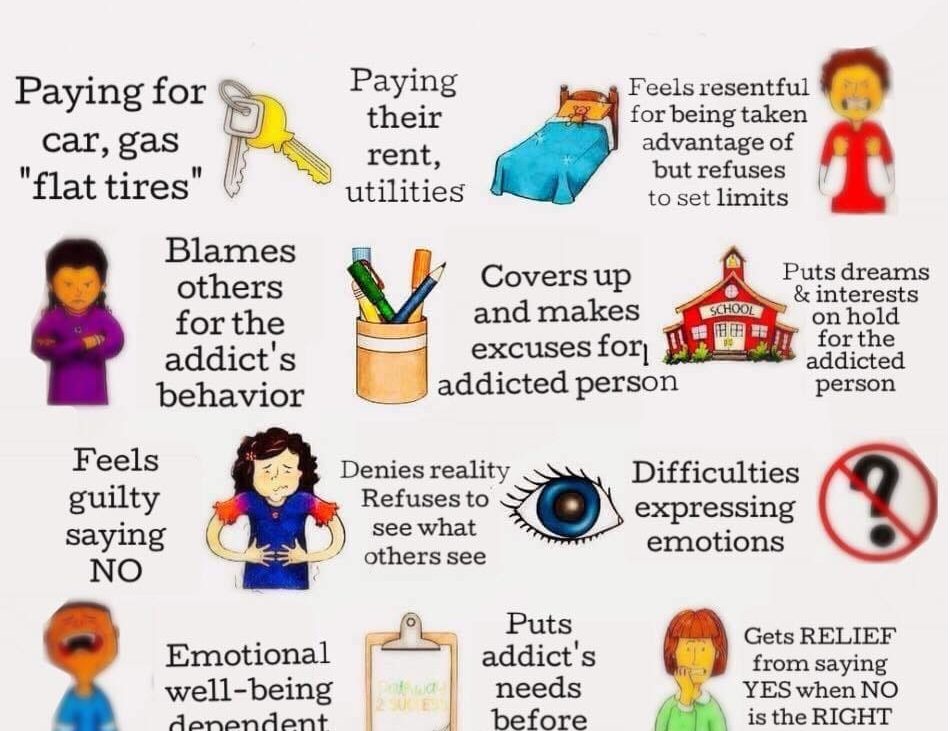
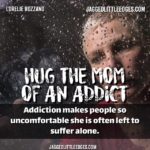

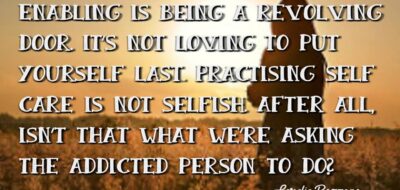
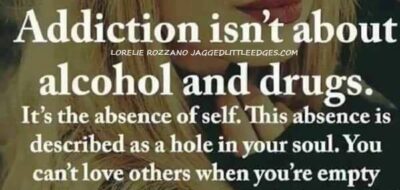
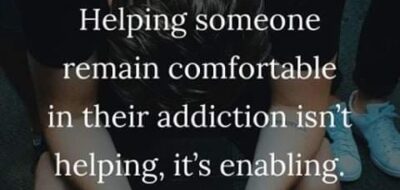
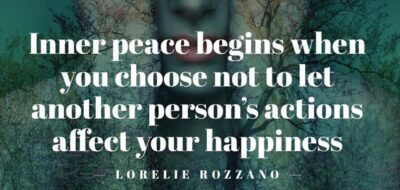
Ty Young
THANK YOU for this post. It has me all over it and I fully resound with it.
My story involves our 17yo son, who began using at age 11 as a coping mechanism after he met his biological father. His abandonment issues took him down a very long and terrifying path and I enabled his addiction (and his depression) by trying to protect him from the consent of his actions.
To get better, I got help. I saw a counselor who helped me understand why I felt like enabling him was the most loving thing I could do, and I learned to draw lines in the sand — boundaries — and “be okay” with disappointing him sometimes. Hard pill to swallow, but I’ve never been more confident and sure of my choices in my life. ?
Since I only became aware of your site yesterday, I haven’t read your other posts yet — but I will.
We’re wrestling
Tina LeBlanc
Can’t read this enough. Thank you ?
Courtney
So true to my life right now. It’s hard losing your husband right before your eyes and hard knowing I’m losing myself. He’s trying to stop and he’s two weeks clean tomorrow but some of these things are still causing conflicts with us. I’m also worried that it’s affected our kid, I know it has but he doesn’t know it’s going on and I don’t know how to help him which breaks my already shattered heart ?
Lorelie
Hi Courtney,
I’m sorry you’re dealing with this. There is so much to learn! For more information on addiction and recovery please follow me on Facebook.
Best wishes!
Susan
So good to read this. Spot on.
Don’t know who to reach out to. Willpower ebbs and flows. Evidence of my own mental health declining surrounds me. My nuclear family is in shambles. Too weak to know anymore where to begin.
Lorelie
Hi Susan,
addiction is a family illness and every bit as devasting to non-users as the addicted person. If we’re not vigilant about our own health. families get sick too. There are some wonderful groups for families affected by addiction. Naranon, Alanon, Celebrate Recovery, Smart Recovery, CODA, ACOA, are just a few. If you’re looking for support google drug and alcohol resources in your community and start calling. Someone will direct you to the services you need.
Danette
Wow! This post is definitely an eye opener. I am an enabler and had no idea..
Syndie
Wow this described me to the T!! Thank you for sharing ? This is a road I wouldn’t wish on my worse enemy ? Has got to be the hardest for a mom to travel, other then losing a child to soon ?
Robin
Please help me. My daughter is and addict. I need help stopping enabling her.
Lorelie
Hi Robin,
Please private message me on Facebook to talk further.